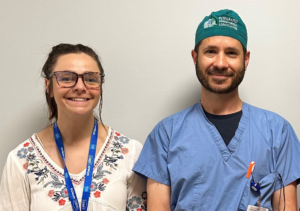IAA is affiliated with multiple research and development programs, allowing team members to work on cutting edge anesthesia research. Contact us to learn more.
EXODOS Study – A Randomized Open Label Trial Investigating Bilateral Rectus Sheath Blocks Using Either Single-Dose Of Liposomal Bupivacaine/Bupivacaine Mixture Vs. Rectus Sheath Block And Catheter Using Continuous infusion and Repeated Doses Of Ropivacaine, Comparing Postoperative Analgesia And Opioid Use Following Open Abdominal Vascular Surgery.
PI: Kevin Finkel, MD
This is a prospective, open label, interventional randomized controlled trial. Patients who are scheduled for open vascular surgeries will be randomized to either LB/B group to receive bilateral rectus sheath blocks using admixture of Liposomal bupivacaine plus bupivacaine, or Catheter group to receive bilateral RS block using ropivacaine for continuous infusion with repeated daily ropivacaine boluses up to 5 postoperative days. The outcomes are the highest, least, average, and current pain scores reported daily up to the end of 120 postoperative hours, time to extubation, total opioid consumption, duration of sensory nerve block, postoperative nausea and vomiting, hospital and PACU length of stay, block related side effects up to discharge date. This study will be applied to receive a grant prior to IRB submission.
Multifidus Study – An Open Label, Randomized Controlled Trial To Compare Multifidus Cervicis Plane (MCP) Block Vs. No Block In Patients Undergoing Posterior Cervical Spine Fusion Surgery.
PI: Pranjali Kainkaryam, MD
This randomized controlled trial to assess whether Multifidus Cervicis Plane (MCP) block will lead to better postoperative patient outcomes (pain control, opioid consumption, mobility, and patient satisfaction) compared to no block in primary posterior cervical spinal fusion patients. This study will be applied to receive a grant prior to IRB submission
PENG Study – A Triple Blinded, Randomized Controlled Trial To Compare Pericapsular Nerve Group (PENG) Block to Placebo Block In Patients Undergoing Elective Primary Total Hip Arthroplasty (THA) Posterior Approach Surgery
PI: William Stuart, MD
This is a triple-blinded prospective interventional randomized controlled trial. Patients who are scheduled for primary total hip arthroplasty (posterior approach) will be randomized to receive either PENG group; preoperative PENG block using Bupivacaine plus adjuncts (Dexamethasone and Epinephrine) or Sham PENG group. All participants will receive additional the SOC intraoperative Intellijoint local infiltration of Ropivacaine by the orthopedic surgeon on the study. The primary outcome is the highest pain score from 0-6 postop hours reported at 2 time points: hour 3 and 6. The secondary outcomes include the highest, average and lowest pain scores for the first 24 postoperative hours opioid consumption, time to first opioid, postoperative nausea and vomiting, initial and furthest distance walked post-surgery, muscular strength of the lower extremities, PACU and hospital length of stay, block related side effects up to 24hrs postop
Left Uterine Displacement Study- Maternal and Fetal Effects of Left Uterine Displacement during Cesarean Delivery: A Randomized Controlled Trial.
PI: Adam Sachs, MD / IRB# HHC-2015-0284
During Cesarean Delivery pregnant women are frequently tilted to the left 15 degrees to reduce compression of the major blood vessels by the uterus. Despite this common practice, there is no conclusive evidence to support this practice. In fact it may even be deleterious to have women positioned in this position. The aim of the study is to determine whether or not tilting women to the left during cesarean section (CS) is helpful or detrimental. To investigate this question, women will be randomly assigned to either be tilted to the left during CS or positioned flat on the table. Fetal acid base status, vasopressor/phenylephrine use, patient satisfaction, maternal complications, and fetal complications will all be collected and compared.
TAPLIP- Bilateral Mid-Abdominal Transverse Abdominis Plane (TAP) And Rectus Sheath (RS) Blocks comparing the use of LIPosomal Bupivacaine/Bupivacaine Admixture Vs. Regular Bupivacaine With Adjuncts In Laparoscopic Colectomy Procedures: A Single-Center, Triple Blinded, Randomized-Controlled Trial.
PI: Kevin Finkel, MD/ NCT # NCT05224089/ IRB # HHC-2021-0331
This study is a randomized control trial, in collaboration with the Colorectal surgery at Hartford Hospital. The primary outcomes include VAS pain scores, the amount of postop. opioid and non-opioid analgesics consumed, block duration, postoperative nausea and vomiting (PONV), hospital and PACU length-of-stay (LOS), the long-term effect of TAP and RS blocks intervention on the incidence of chronic pain, and patient’s overall satisfaction. The study is approved by HHC IRB and open to enrollment, also registered with the National Clinical Trials.
Acupuncture- Open-Label Randomized Controlled Trial to Assess Preoperative Acupuncture for Patients Undergoing Total Knee or Hip Arthroplasty.
PI: Pranjali Kainkaryam, MD/ IRB# HHC-2021-0348
This study is a randomized control trial, in collaboration with orthopedic surgery at Bone and Joint Institute. The primary objective is the reduction in preoperative anxiety and postoperative pain in high-anxiety patients undergoing THA or TKA while the secondary objectives include the safety of preoperative acupuncture, postoperative nausea and vomiting, postoperative opioid consumption, and patients’ satisfaction. The study is approved by HHC IRB and open to enrollment.
STORMING- A Pilot Study for Feasibility and Safety of Satellite Ganglion Block (SGB) to Control Paroxysmal Sympathetic Hyperactivity (PSH) After Severe Traumatic Brain Injury (TBI)
PI: Yasser Al-Baghdadi, MD / IRB# HHC-2022-0019
This is a pilot study in collaboration with the neuro-intensive care unit at Hartford Hospital ICU. The primary outcomes are to determine the safety and feasibility of Stellate Ganglion Block in patients with TBI associated with PSH attacks in the ICU and to determine if SGB can improve symptoms associated with PSH (hypertension, hyperthermia, tachycardia, tachypnea, diaphoresis, dystonia). This study is still under the revision of HHC IRB for final approval. It was approved by IAA for the financial support of the study intervention.

If you would like to learn more about IAA Hartford Division Research, please contact us. We would love to hear from you.
Mailing Address:
Department of Anesthesia Research / Department of Anesthesiology
Hartford Hospital
80 Seymour Street, JB321
Hartford, CT 06102
Office Hours:
Monday – Friday 8:00 am – 5:00 pm
Contacts:


Kevin J. Finkel, MD, FASA
Medical Director of Clinical Research,
Department of Anesthesia Research, Hartford Division
Email Dr. Finkel

Aseel Walker, MD
Director of Clinical Research,
Department of Anesthesia Research, Hartford Division
Tel: 860-972-1778
Email Aseel
Sarah Vincze, MPH
Research Internship Program Coordinator
Research Assistant, IAA
Department of Anesthesia Research, Hartford Division
Tel: 860-972-5487
Email Sarah
©2024 Integrated Anesthesiologists Association All Rights Reserved. PRIVACY POLICY